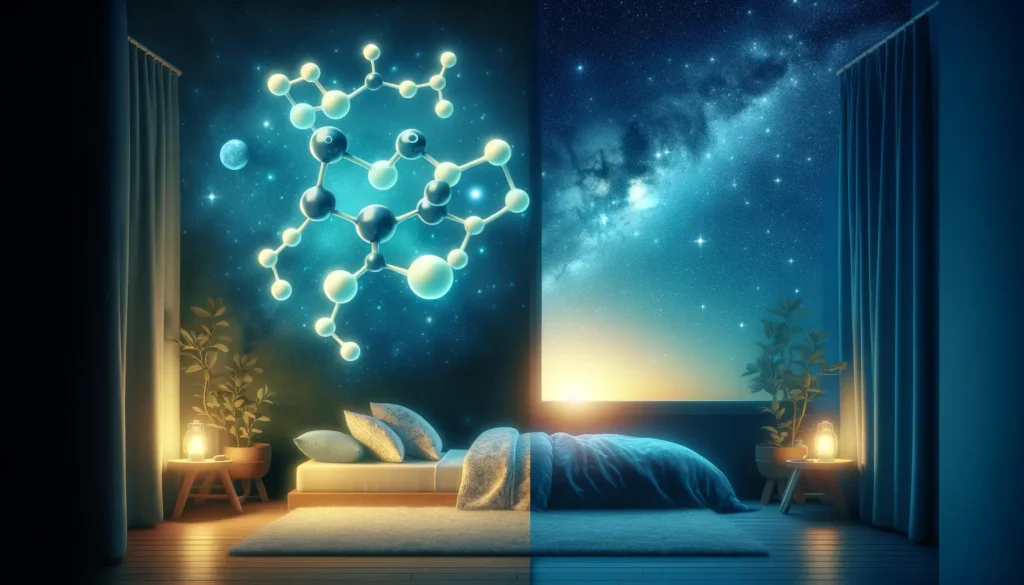Sleep plays a crucial role in maintaining sexual health and hormone balance. Numerous studies have shown that sleep quality, duration, and patterns can impact various aspects of sexual function and well-being.
Lack of sleep and sleep disorders have been associated with sexual dysfunction and decreased libido. On the other hand, getting sufficient sleep and practicing good sleep hygiene can enhance sexual performance, satisfaction, and desire.
Hormones such as cortisol, melatonin, growth hormone, estrogen, progesterone, and testosterone are influenced by sleep, and disruptions in their levels can affect sexual health.
Key Takeaways:
- Sleep quality, duration, and patterns can impact sexual function and well-being.
- Lack of sleep and sleep disorders have been associated with sexual dysfunction and decreased libido.
- Getting sufficient sleep and practicing good sleep hygiene can enhance sexual performance, satisfaction, and desire.
- Disruptions in hormones such as cortisol, melatonin, growth hormone, estrogen, progesterone, and testosterone can affect sexual health.
The Relationship Between Sleep and Hormones
Sleep and hormones have a bidirectional relationship. Hormones control sleep-wake cycles and are released in response to the body’s circadian rhythm. Cortisol, the stress hormone, is regulated by sleep and plays a crucial role in other hormonal functions.
Disruptions in sleep can affect the balance of hormones in the body, including estrogen, progesterone, and thyroid hormones. Additionally, sleep has an impact on hunger hormones such as insulin, leptin, and ghrelin, which can influence appetite and weight gain.
The sleep hormone, melatonin, controls sleep patterns, while growth hormone is released during deep sleep, promoting cell growth and repair.
The Impact of Sleep on Hormone Regulation
Proper hormone regulation is crucial for maintaining overall health and well-being. Sleep plays a significant role in this regulation process. During sleep, the body releases hormones in a specific pattern, responding to the body’s internal clock and circadian rhythm.
Cortisol, known as the stress hormone, follows a circadian rhythm, with the highest levels in the morning upon awakening and gradually decreasing throughout the day. Adequate sleep allows cortisol levels to peak in the morning, kick-starting the release of other hormones and promoting hormonal balance.
On the other hand, inadequate sleep or sleep disturbances can lead to elevated cortisol levels. Chronic sleep deprivation or poor-quality sleep can disrupt the delicate balance of hormones in the body. Elevated cortisol levels can contribute to imbalances in other hormones, potentially affecting metabolism, immune function, and overall health.
Estrogen and progesterone, the primary female sex hormones, are also influenced by sleep. Disruptions in sleep can affect their levels and balance, potentially causing imbalances and affecting menstrual cycle regularity, fertility, and sexual health.
In men, insufficient sleep can lead to decreased levels of testosterone, affecting libido, sexual function, and overall well-being.
The Role of Hunger Hormones and Sleep
Sleep can also impact hunger hormones, which regulate appetite and metabolism. Insulin, leptin, and ghrelin are hormones involved in hunger regulation and energy balance. The production and release of these hormones can be influenced by sleep patterns and quality.
Inadequate sleep or sleep deprivation can disrupt the balance of hunger hormones, leading to increased hunger and appetite. It can reduce levels of leptin, the hormone responsible for signaling fullness, and increase levels of ghrelin, the hormone responsible for stimulating hunger. These disruptions can result in overeating, weight gain, and an increased risk of obesity.
Melatonin and Growth Hormone: Sleep’s Role in Cell Repair and Growth
Melatonin, often referred to as the sleep hormone, plays a crucial role in regulating sleep patterns. This hormone is responsible for signaling the body when it’s time to sleep and wake up.
During deep sleep, the body releases growth hormone, which promotes cell growth and repair. Growth hormone is especially important in children and adolescents as it contributes to their growth and development. In adults, growth hormone aids in tissue repair, muscle growth, and maintenance.
Overall, sleep is essential for maintaining hormone balance and ensuring proper function of various bodily systems. Disruptions in sleep can lead to imbalances in hormones, affecting sexual health, appetite regulation, metabolism, and overall well-being.
By prioritizing good sleep hygiene and getting sufficient high-quality sleep, you can optimize hormone regulation and promote better health outcomes.
| Hormone | Role | Impact of Sleep |
|---|---|---|
| Cortisol | Stress hormone | Regulated by sleep, disruptions affect overall hormone balance |
| Estrogen | Primary female sex hormone | Disruptions in sleep can affect levels and balance, potentially impacting menstrual cycle regularity, fertility, and sexual health |
| Progesterone | Primary female sex hormone | Disruptions in sleep can affect levels and balance, potentially impacting menstrual cycle regularity, fertility, and sexual health |
| Testosterone | Primary male sex hormone | Insufficient sleep can lead to decreased levels, affecting libido, sexual function, and overall well-being |
| Insulin | Hormone involved in regulating blood sugar levels | Sleep disruptions can impact insulin levels, potentially leading to insulin resistance and weight gain |
| Leptin | Hormone responsible for signaling fullness | Inadequate sleep can reduce leptin levels, increasing hunger and appetite |
| Ghrelin | Hormone responsible for stimulating hunger | Inadequate sleep can increase ghrelin levels, leading to increased hunger and appetite |
| Melatonin | Sleep hormone | Regulates sleep patterns, signaling the body when it’s time to sleep and wake up |
| Growth hormone | Promotes cell growth and repair | Released during deep sleep, crucial for tissue repair, muscle growth, and maintenance |

The Impact of Sleep on Cortisol and Stress
Sleep plays a crucial role in regulating cortisol levels and influencing the body’s response to stress. Adequate sleep allows cortisol levels to peak in the morning, facilitating the release of other hormones and promoting overall hormonal balance.
Conversely, poor sleep, sleep deprivation, or chronic sleep disturbances can lead to elevated cortisol levels, disrupting the delicate balance between hormones in the body and potentially affecting overall health and well-being.
“The quantity and quality of sleep directly impact cortisol regulation,” explains Dr. Sarah Johnson, a sleep specialist.
Cortisol, often referred to as the stress hormone, is produced by the adrenal glands and is essential for various bodily processes, including metabolism, immune response, and inflammation control.
However, when cortisol levels remain consistently high due to inadequate sleep, it can contribute to chronic stress, decreased immune function, weight gain, and mood disorders.
Research has shown that sleep disturbances, such as insomnia or sleep apnea, can disrupt the natural cortisol rhythm, leading to abnormal fluctuations throughout the day. This imbalance can affect hormone production and interfere with the body’s ability to manage stress effectively.
Moreover, sleep deprivation can further exacerbate stress levels, creating a vicious cycle that impacts both sleep quality and cortisol regulation.
“Sleep deprivation not only impairs the body’s ability to regulate cortisol effectively but also impairs cognitive function, mood stability, and overall well-being,” emphasizes Dr. Johnson.
It is crucial to prioritize healthy sleep habits and establish a consistent sleep routine to support optimal cortisol regulation and manage stress effectively. Practicing good sleep hygiene, such as maintaining a comfortable sleep environment, following a regular sleep schedule, and engaging in relaxation techniques before bed, can significantly contribute to improved sleep quality and overall hormone balance.
Effects of Sleep on Cortisol Regulation:
| Sleep Quality | Cortisol Regulation |
|---|---|
| Good quality sleep | Allows cortisol to peak in the morning, promoting hormonal balance. |
| Poor sleep or sleep deprivation | Leads to elevated cortisol levels, disrupting hormone balance and increasing stress. |
| Chronic sleep disturbances | Can cause abnormal cortisol fluctuations throughout the day, impacting stress management. |
By understanding the significant role sleep plays in cortisol regulation and stress management, individuals can prioritize their sleep health and make conscious efforts to improve sleep quality. Implementing healthy sleep habits can positively impact overall hormone balance, leading to better physical and mental well-being.

Sleep and Reproductive Hormones
Sleep plays a crucial role in regulating reproductive hormones such as estrogen, progesterone, and testosterone. Disruptions in sleep can disrupt the delicate balance between these hormones, potentially impacting sexual function, libido, and sexual satisfaction.
Estrogen and progesterone, primarily produced by the ovaries, are essential for reproductive health in women. Sleep disturbances can lead to imbalances in these hormones, affecting their intricate dance and causing a slowdown in thyroid function. This, in turn, can have a further impact on metabolism and overall sexual health.
Testosterone, on the other hand, is a primary male sex hormone but is also present in women in smaller amounts. Sleep deprivation or poor sleep quality can result in reduced testosterone levels, leading to decreased libido and potential problems with sexual function.
| Hormone | Sleep and Hormone Regulation |
|---|---|
| Estrogen | Sleep disturbances can lead to imbalances in estrogen levels, affecting the delicate dance between estrogen and other hormones. |
| Progesterone | Poor sleep can disrupt progesterone levels, potentially impacting fertility and menstrual cycle regularity. |
| Testosterone | Sleep deprivation can lower testosterone levels, leading to decreased libido and sexual function. |
Having a healthy sleep routine, practicing good sleep hygiene, and ensuring sufficient sleep can help maintain the balance of reproductive hormones, promoting sexual well-being and satisfaction.
Sleep, Hunger Hormones, and Metabolism
Poor sleep or sleep disruption can have a direct impact on hunger hormones, such as insulin, leptin, and ghrelin, which play a crucial role in regulating appetite, hunger, and food intake.
When sleep is lacking or of poor quality, the delicate balance of these hormones can be disrupted, leading to disturbances in hunger cues and appetite regulation. This can contribute to overeating, cravings for unhealthy foods, and weight gain.
Insulin is responsible for regulating glucose metabolism and keeping blood sugar levels in check. Inadequate sleep can impair insulin sensitivity, making it less effective at removing glucose from the bloodstream, ultimately leading to insulin resistance and an increased risk of developing type 2 diabetes.
Leptin, often referred to as the “satiety hormone,” signals fullness to the brain, suppressing appetite and reducing food intake. Sleep deprivation or poor sleep can lower leptin levels, tricking the brain into thinking the body needs more food. This can result in increased hunger and a tendency to overconsume calories.
Ghrelin, on the other hand, is known as the “hunger hormone” as it stimulates appetite and promotes food intake. Lack of sleep can elevate ghrelin levels, leading to heightened hunger sensations and a greater desire for calorie-dense foods. This combination can contribute to weight gain and an unhealthy diet.
Furthermore, sleep deprivation can also affect overall metabolic regulation. When the body is sleep-deprived, metabolism slows down, leading to a decrease in energy expenditure. This sluggish metabolism can hinder weight loss efforts and contribute to weight gain.
In conclusion, prioritizing good-quality sleep is crucial for maintaining a healthy metabolism and regulating hunger hormones. By getting sufficient sleep, you can support optimal hormone function, appetite control, and overall metabolic balance.
Conclusion
Sleep is crucial for maintaining hormone balance and promoting overall sexual health. The impact of sleep on hormone regulation is significant, as it affects the release and function of various hormones in your body.
Disruptions in sleep can lead to imbalances in cortisol, reproductive hormones, hunger hormones, and growth hormone, which can in turn affect sexual function, libido, appetite regulation, and metabolism.
To maintain hormone balance and sexual well-being, it is important to prioritize good sleep hygiene and ensure you get sufficient high-quality sleep. This involves establishing a consistent sleep schedule, creating a comfortable sleep environment, practicing relaxation techniques before bed, and avoiding stimulants and electronic devices in the evening.
By taking steps to optimize your sleep, you can support the healthy regulation of hormones that contribute to sexual health and overall well-being. Remember, a good night’s sleep is not only important for feeling rested and refreshed, but also for maintaining a harmonious balance of hormones that influence your sexual function and satisfaction.
FAQ
How does sleep impact sexual health and hormone balance?
Sleep plays a crucial role in maintaining sexual health and hormone balance. Lack of sleep and sleep disorders can lead to sexual dysfunction and decreased libido, while getting sufficient sleep and practicing good sleep hygiene can enhance sexual performance, satisfaction, and desire.
How does sleep affect hormones?
Sleep and hormones have a bidirectional relationship. Hormones control sleep-wake cycles and are released in response to the body’s circadian rhythm. Disruptions in sleep can affect the balance of hormones such as cortisol, estrogen, progesterone, and thyroid hormones, which can impact sexual health and overall well-being.
What is the impact of sleep on cortisol and stress?
Sleep regulates cortisol levels and impacts the body’s response to stress. Poor sleep or chronic sleep disturbances can lead to elevated cortisol levels, disrupting the delicate balance between hormones in the body and potentially affecting overall health and well-being.
How does sleep influence reproductive hormones?
Sleep disruption can disrupt the balance of reproductive hormones like estrogen, progesterone, and testosterone, which can affect sexual function, libido, and satisfaction.
How does sleep affect hunger hormones and metabolism?
Sleep disruption can directly affect the production and levels of hunger hormones, such as insulin, leptin, and ghrelin, leading to disturbances in hunger, appetite, and food intake. Good-quality sleep is crucial for metabolic regulation and overall hormonal balance.
What is the importance of sleep for sexual health?
Sleep is essential for maintaining hormone balance and overall sexual health. Practicing good sleep hygiene and getting sufficient high-quality sleep are important for promoting hormone balance and sexual well-being.
What is the impact of sleep on sexual satisfaction and desire?
Sleep quality, duration, and patterns can influence sexual satisfaction and desire. Disruptions in sleep can lead to sexual dysfunction and decreased libido, while getting enough sleep can enhance sexual performance and desire.
How can sleep patterns and sleep disorders affect sexual well-being?
Sleep patterns and sleep disorders, such as sleep apnea or insomnia, can disrupt hormone balance and impact sexual well-being. Managing sleep disturbances and practicing good sleep hygiene can help improve sexual health.
What are some tips for improving sleep hygiene for better sexual health?
Tips for better sleep hygiene include maintaining a regular sleep schedule, creating a relaxing bedtime routine, optimizing the sleep environment, avoiding stimulants and electronics before bed, and managing stress levels. These practices can contribute to better sexual health and overall well-being.




